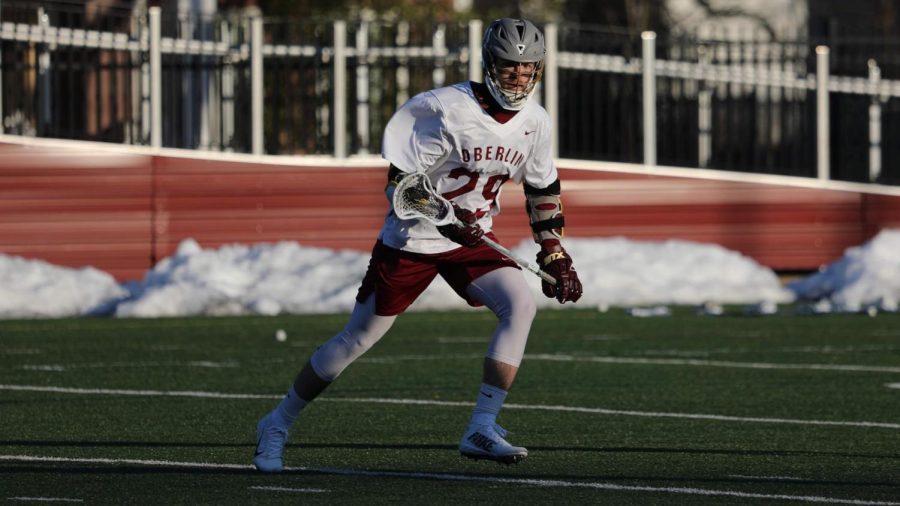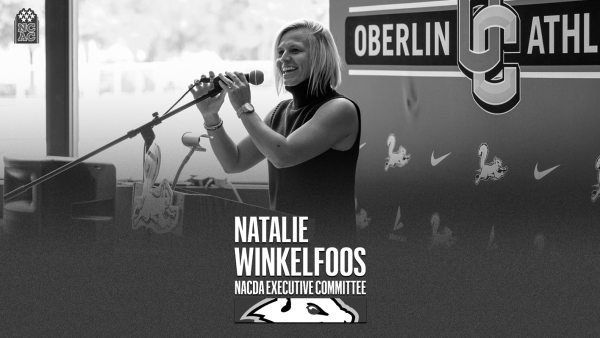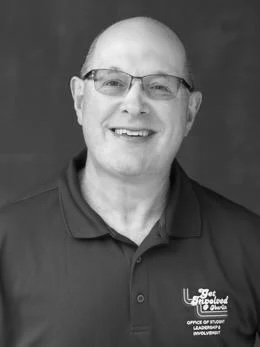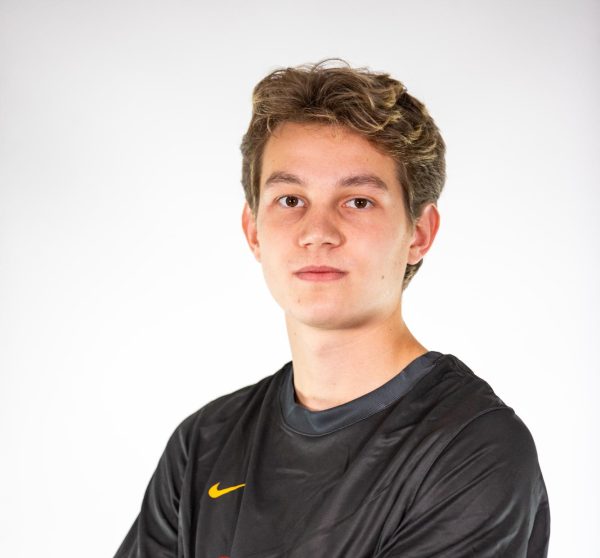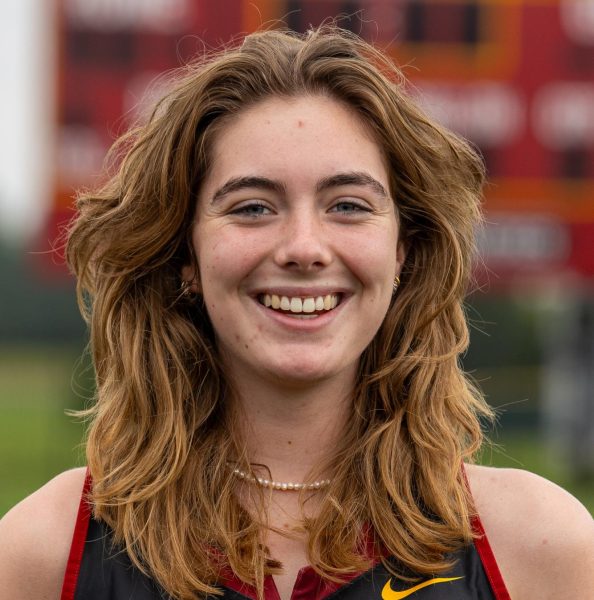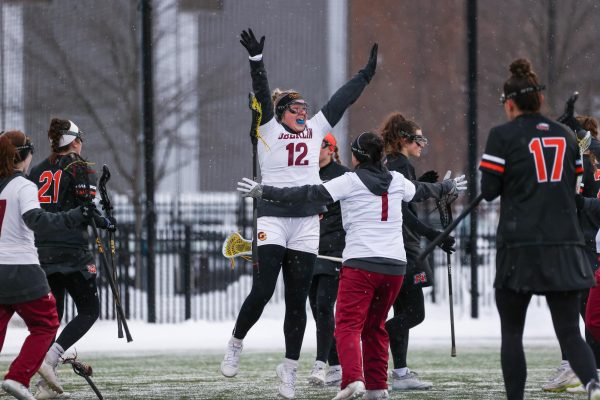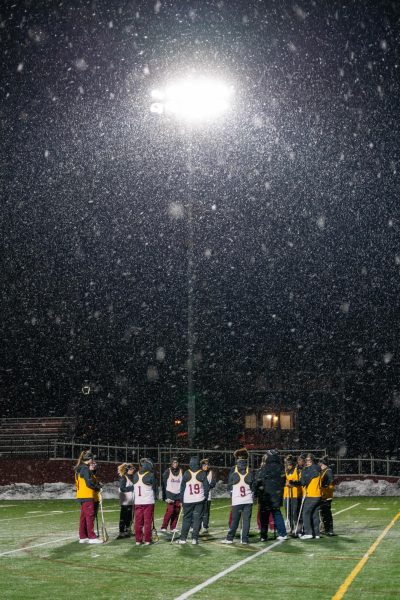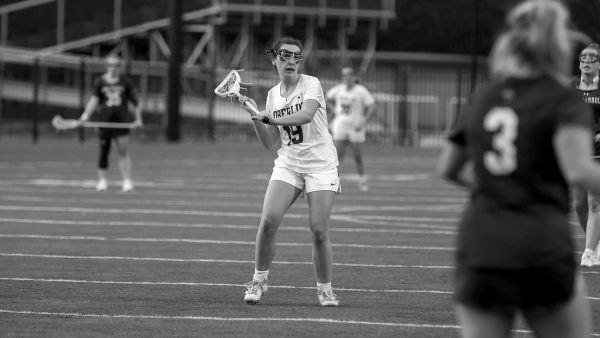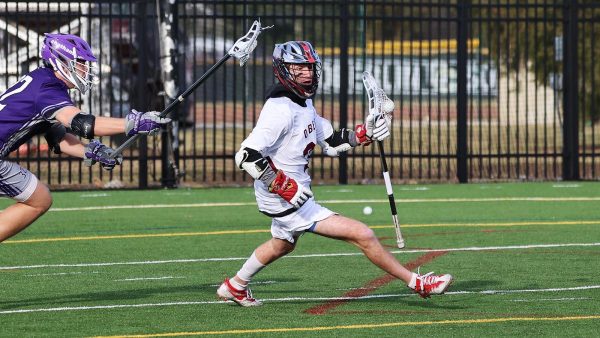In the Locker Room with Alex Scott, Lacrosse Player and Community Builder
College fourth-year Alex Scott on the field.
Fourth-year Alex Scott’s eyes light up when he describes the communities that have defined his College experience. During his second year at Oberlin, he was encouraged to join the men’s lacrosse team while in a drama class with one of his future teammates. Since then, he has flourished both on and off the field, finding a supportive and dynamic community through the team, as well as through his summer work with Camp Jabberwocky and the Tulgey Wood program. Camp Jabberwocky and the Tulgey Wood are programs that provide a summer camp experience and community for individuals with and without disabilities.
This interview has been edited for length and clarity.
How long have you been playing lacrosse? What sparked your interest in the sport?
I’ve been playing lacrosse for three years at Oberlin, and I played lacrosse prior for a couple of years in middle and high school. It was the coolest sport in middle school; it felt very hip and New England to play lacrosse. But it was definitely not my favorite sport in high school, because I felt that there was a lot of toxic culture surrounding lacrosse. So, I stopped playing after two years in high school. When I got to Oberlin, I met a bunch of really rad guys on the team who were completely unlike anything I’d experienced in New England, so I decided to try out.
What have been your favorite aspects of being a student-athlete?
The community and support. Lacrosse was never my strongest sport, but since I got on the team there has been nothing but love and support for me as a person and as a player. One memory stands out in particular. On my first day of spring practice, I skipped because I had bad imposter syndrome and I didn’t think I deserved to be on the field. The captains sat me down and Erik Zeug [OC’ 20] who was one of the biggest proponents of getting me to join the team, told me that whether I knew it or not, I was a part of the family — and if I wanted to be here, I was loved and welcome to stay. But if the environment was not for me, I was free to choose my own path and find what made me happy. This has been consistently true every day. I haven’t played many games, but when I do get out there, I’ve never felt more supported than when I am with the team.
Given the uncertainty of a spring season, how are you and your teammates keeping up morale?
We’re taking it day by day. We are constantly and consistently appreciative of the opportunity that we have. Our coach reminds us that at any given moment in your day, there is usually an obstacle that we face, then there is a response to the task, and finally there’s an outcome from that response. We can’t control the outcome and we can’t control the challenge, but we can control our response.
We’re all being faced with a difficult situation. We can’t control when a vaccine is going to come out or the extent to which we can have a season, but we can control our response. We can put on our masks, wash our hands, and get out on the field and grind because that’s the opportunity that we’ve been given. All things considered, I think we’ve responded in the best way possible. My teammates are in the gym, coming in early for practice, and we’re still grinding to become the best athletes that we can be.
Outside of lacrosse, what are your other interests?
For the past three years I’ve volunteered with Camp Jabberwocky, a summer camp experience that brings together a community of people with and without varying levels of disabilities. I also work with the Tulgey Wood, which is a similar program to Camp Jabberwocky with a couple of distinct differences. At Camp Jabberwocky we use the term camper and counselor because it’s supposed to be a summer camp experience, but I’ve never felt comfortable with that terminology because I have friends there who are as young as 13, and others are closer to my parents age.
Overall, both programs are focused on providing a camp experience — we go to the beach, I teach archery, improv, and help make sure my friends are having a good time. I’m also responsible for ensuring that everyone’s mobility needs are being met. I help my friends brush their teeth, get dressed, shower, and use the restroom.
Do you have a favorite memory from your work with Camp Jabberwocky?
I honestly feel like most of my favorite memories involve me and one of my close friends in the bathroom. You have a lot of good ‘life, liberty, and pursuit of happiness’ kind of conversations while you’re sitting with someone on the toilet.
Another one of my favorite memories is with one of my friends David. He has a condition that makes it crucial for us to make sure he’s getting the right amount of calories and drinking enough water. One day me and my friends noticed that David wasn’t drinking enough water, and he’s a big sucker for peer pressure. So I told him how many glasses of water I had that day and that it’s either “hydrate or diedrate.” David looked over at me in all seriousness and said “I’d rather diedrate.” I thought it was so funny because I had never known that it was a real option. But there are too many memories from camp to just pick one.
Because of COVID-19, we couldn’t have our typical summer camp experience this year, but I’m going to try to visit my friends while I’m home in a COVID-safe manner.
Has your work with Camp Jabberwocky impacted your career aspirations?
I’ve always been interested in health and healthcare, which is why I think Camp Jabberwocky was such a perfect fit for me. I’m considering pursuing a career as a speech language pathologist. A lot of my friends at Camp Jabberwocky and the Tulgey Wood work with speech language pathologists. While they can work in a wide range of settings, speech language pathologists help my friends with speaking, chewing, swallowing, and different things that deal with the mouth-nose region.
Do you see any similarities between your work with Camp Jabberwocky and being on the men’s lacrosse team?
The love I have for my friends at Jabberwocky is the same kind of love as I have for my teammates. The types of friendships that I make within both programs are intimate, but in different ways. The kind of relationship I have with my friends when I’m on the field, when we’re all working towards a common goal, is different than the kind of intimacy I get with my friends when I’m helping them get dressed in the morning — but at the end of the day, they’re both friendships and they’re both filled with a lot of love.


